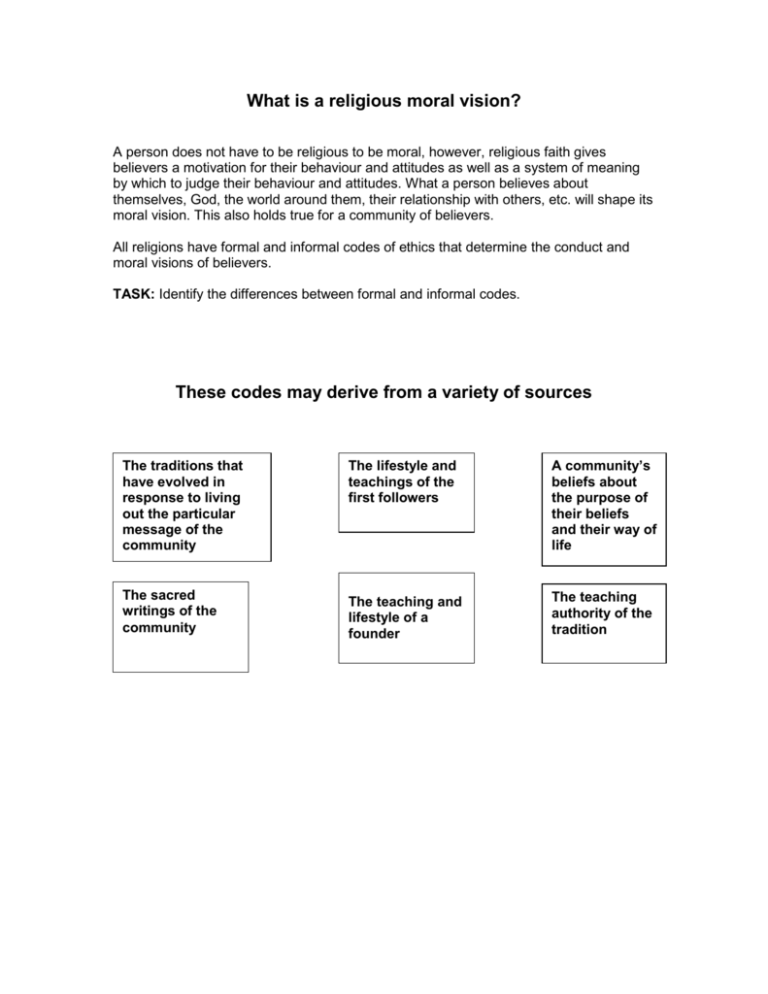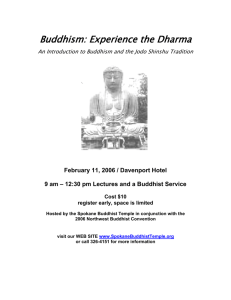What is a religious moral vision
advertisement

What is a religious moral vision? A person does not have to be religious to be moral, however, religious faith gives believers a motivation for their behaviour and attitudes as well as a system of meaning by which to judge their behaviour and attitudes. What a person believes about themselves, God, the world around them, their relationship with others, etc. will shape its moral vision. This also holds true for a community of believers. All religions have formal and informal codes of ethics that determine the conduct and moral visions of believers. TASK: Identify the differences between formal and informal codes. These codes may derive from a variety of sources The traditions that have evolved in response to living out the particular message of the community The lifestyle and teachings of the first followers A community’s beliefs about the purpose of their beliefs and their way of life The sacred writings of the community The teaching and lifestyle of a founder The teaching authority of the tradition Buddhism Buddhist ethics are governed by the avoidance of harm and suffering. A Buddhist will examine whether a certain action is likely to harm one’s self or others. On reflection the person will then be able to avoid the harmful action. The emphasis in Buddhist morality is on intention. The Eightfold Path Right views Right intentions Right speech Right action Right livelihood Right effort Right mindfulness Right concentration Five precepts – These are training rules rather than laws or commandments and are expected to be observed by every lay Buddhist. If a Buddhist were to break any of them he or she should be aware of this and examine how this may be avoided in the future. The result of an action (karma) depends essentially upon its intention, and feelings of guilt tend not to arise. Guilt, anxiety and remorse should be avoided as they distract from the cultivation of a calm and peaceful mind. To undertake the training to avoid taking the life of living beings. To undertake the training to avoid taking things not given, To undertake the training to avoid sensual misconduct To undertake the training to refrain from false speech To undertake the training to abstain from substances that cause intoxication and heedlessness. Judaism The basis of the Jewish moral vision is that every human is created in the image and likeness of God and is therefore worthy of dignity and respect. People live moral lives so that they may reach towards God and towards others. The Torah is the primary source for Jewish ethics, alongside this is the Mishnah or oral Torah which guides the life of the Jewish people in changing circumstances. The Torah and Mishnah together form the Talmud which teaches people how to live. In the Torah there are 613 mitzvot (commandments) of which the best known are the Ten Commandments. Charity forms the basis of Jewish ethics. tzedakah is the concept of hidden charity, those who practice this must hide their identity so that those who receive from them do not feel ashamed when they meet. Gemilut Chasidim (acts of loving kindness) these are acts of charity that are done for no reward. Giving hospitality to strangers Visiting the sick Assisting a poor or orphaned bride Accompanying the dead to the grave. The Ten Commandments (Exodus 20:1-17) I am the Lord your God, who brought you out of the land of Egypt, out of the house of slavery, you shall have no other God before me. You shall not make for yourself an idol… You shall not make wrongful use of the name of the Lord your God… Remember the Sabbath day and keep it holy. Honour your father and your mother…. You shall not murder. You shall not commit adultery. You shall not steal. You shall not bear false witness against your neighbour You shall not covet your neighbour’s house; you shall not covet your neighbour’s wife…or anything that belongs to your neighbour. Christianity The life and teaching of Jesus is the foundation of the Christian moral vision. This vision is rooted in the belief that God loved the world so much that he gave his only Son so that all who believe may have eternal life. This vision is also rooted in Jesus’ preaching of the Reign of God as the time when the fullness of life in God’s reign of justice and compassion will be realized. The Christian moral life is based on the following of Jesus and living in relationship with him. When confronted with decisions about how to live, Christians look to: The life and teachings of Jesus as expressed in the New Testament The teachings of the church Their own individual conscience “So if I your Lord and teacher, have washed your feet, you also ought to wash one another’s feet. For I have set you an example, that you also should do as I have done to you.” John 13:14-15 “You shall love the Lord your God with all your heart, and with all your soul and with all your mind.” This is the greatest and first commandment. And the second is like it: “You shall love your neighbour as yourself. On these two commandments hang all the law and prophets.” Matthew 22:37-40 “Blessed are the poor in spirit, for theirs is the kingdom of heaven. Blessed are those who mourn, for they will be comforted. Blessed are the meek, for they shall inherit the earth. Blessed are those who hunger and thirst for righteousness, for they will be filled. Blessed are the merciful, for they will receive mercy. Blessed are the pure in heart, for they will see God. Blessed are the peacemakers, for they will be called children of God. Blessed are those who are persecuted for righteousness sake, for theirs is the kingdom of heaven.” Matthew 5:3-10 “As God’s chosen ones, holy and beloved, clothe yourselves with compassion, kindness, humility, meekness and patience. Bear with one another and, if anyone has a compliant against another, forgive each other, just as the lord has forgiven you, so you must forgive. Above all, clothe yourselves with love, which binds everything together imperfect harmony.” Colossians 3:12-14 Hinduism In Hinduism, the word dharma stands for everything that involves leading a life of proper conduct. The world is sustained by dharma, a set of values that supports and sustains normal life in the world. Dharma can be translated as religious duty, and has two dimensions to it – universal dharma (samanya dharma) that everybody should uphold, and (vishesa dharma) which are particular religious duties for members of Hindu society. Society acts on the assumption that all people speak the truth and act honestly. To live a life of dharma is to live in accordance with the moral principles inherent in the universe. Hindus believe that a person cannot avoid the consequences of their actions - karma. Speak the truth, practice right conduct; don’t neglect what you have studied. Let your mother be like a god to you, let your father be like a god to you, let the teacher belike a god to you, treat the unexpected guest who comes to your house like a god. Don’t do actions that are blameworthy, do those actions that are not blameworthy. The Upanishads Islam The basis of the ethical system in Islam lies in the intent to live in submission to the will of Allah. The principal duty of a Muslim is to live by the Five pillars of Islam: Shahada Salat Zakat Fasting Hajj The Muslim way of life makes no distinction between worship and work, religion and life, personal and communal, sacred and secular. People have two main areas of responsibility: their duties towards God and their duties towards each other. Islamic Law is called Shari’a Ethical Principles Set nothing beside God Treat your parents kindly Do not kill your children for fear of poverty for you and they will be provided for Have nothing to do with what is impure, either in the body or in the mind Slay no one whom God has protected, except weigh proper cause Lay no hand on the property of the orphan except to increase it, until he reaches maturity. Give full weight and measure as justice demands. If you give your word, fulfill it, even at the expense of your kin, thereby fulfilling the covenant of God. Godliness is not that you turn your faces to the east or the west; godly rather is one who believes in God, the last day, the angels, the Book, and the prophets, one who gives of his property, despite his love of it, to his kin, to the orphan, to the poor, to the traveller, to the beggar; (godly is) one who frees slaves, who performs the ritual prayer, and prays the poor tax. Godly are those who are faithful to a pledge they have made; who are patient in bearing difficulty, hardship, and trials. It is such as these who (when they say they believe) are speaking the truth. It is such as these who are devout. (sura 2:177) Worship God, set nothing alongside Him. Be gracious to your parents, your kin, the orphan, the poor, the neighbour, whether of your kin or not of your kin, the traveler, the wayfarer, and your slaves. (sura 4:36)






